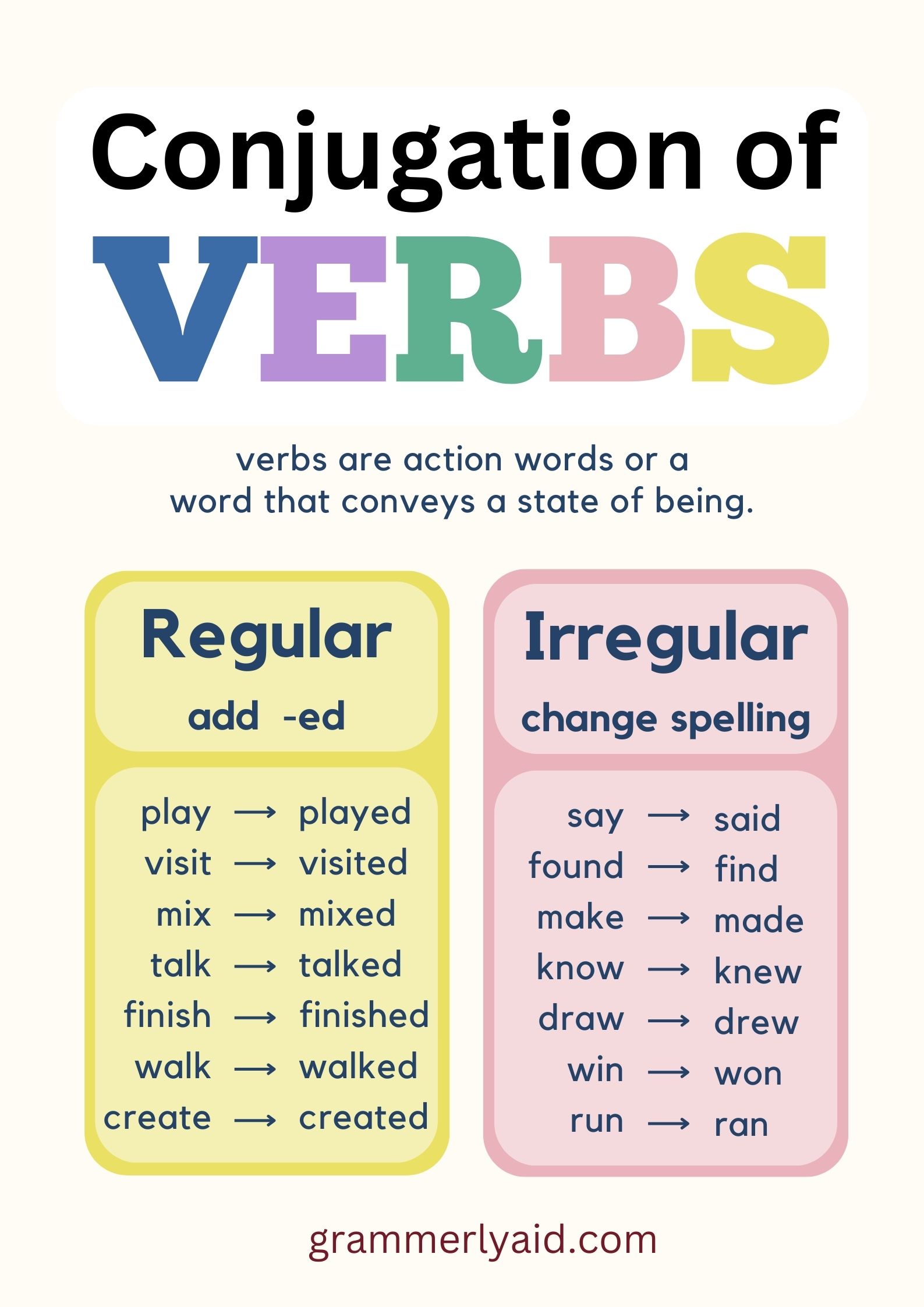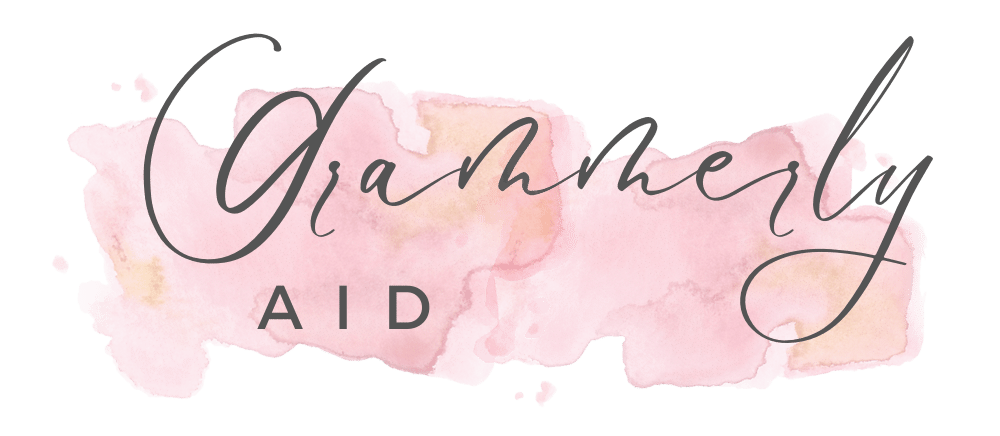Verbs are like the superheroes of our sentences. They show action, express states of being, and help us communicate effectively. But did you know that verbs can change form depending on who is doing the action and when it’s happening? This magical transformation is called verb conjugation, and today, we’re going to explore it in detail!
What is Verb Conjugation?
Verb conjugation is the process of changing a verb to match the subject of a sentence, as well as its tense (when the action happens). In simpler terms, it’s like giving the verb a different costume depending on who’s using it and when they’re using it.

Kinds of conjugation of verbs:
There are two main kinds of conjugation of verbs-
- Weak verbs or Regular verbs
- Strong verbs or Irregular verbs
Weak verbs or Regular verbs
Verbs that form their past tense by adding -ed, -d or -t to the present, with or without any inside change are called weak or regular verbs.
- Regular Verb Example:
- Infinitive: to play
- Present Tense: I play, you play, he/she/it plays, we play, they play
- Past Tense: I played, you played, he/she/it played, we played, they played.
Conjugation of Regular Verbs to Form Simple Past and past participle
1)We often add -ed to verbs (regular verbs) to make the past simple and past participle:
| Regular verbs | simple past | past participle |
| add | add | added |
| allow | allowed | allowed |
| appear | appeared | appeared |
| ask | asked | asked |
| boil | boiled | boiled |
| borrow | borrowed | borrowed |
| cheer | cheered | cheered |
| clean | cleaned | cleaned |
| climb | climbed | climbed |
| delay | delayed | delayed |
| discuss | discussed | discussed |
| dream | dreamed | dreamed |
| end | ended | ended |
| enjoy | enjoyed | enjoyed |
| fail | failed | failed |
| fill | filled | filled |
| hang | hanged | hanged |
| jump | jumped | jumped |
| look | looked | looked |
2) We often add -d only if a verb ends in -e to make the past simple and past participle:
| Regular verbs | simple past | past participle |
| agree | agreed | agreed |
| close | closed | closed |
| divide | divided | divided |
| hope | hoped | hoped |
| lie | lied | lied |
| die | died | died |
| loose | loosed | loosed |
| love | loved | loved |
| place | placed | placed |
| complete | completed | completed |
| change | changed | changed |
| compare | compared | compared |
| care | cared | cared |
| dare | dared | dared |
| dance | danced | danced |
| arrange | arranged | arranged |
| divide | divided | divided |
| gaze | gazed | gazed |
| charge | charged | charged |
3)If a verb ends in consonant -y, change -y to -i and add -ed to make the past simple and past participle:
| Regular verbs | Simple past | Past participle |
| bury | buried | buried |
| carry | carried | carried |
| cry | cried | cried |
| dry | dried | dried |
| fry | fried | fried |
| try | tried | tried |
| hurry | hurried | hurried |
| marry | married | married |
| lay | laid | laid |
| pay | paid | paid |
| say | said | said |
| marry | married | married |
| multiply | multiplied | multiplied |
| identify | identified | identified |
4)If a verb ends in a consonant-vowel-consonant (CVC) pattern, double the final consonant and add -ed.
| Regular verbs | past form | past participle |
| beg | begged | begged |
| drop | dropped | dropped |
| hop | hopped | hopped |
| emit | emitted | emitted |
| nod | nodded | nodded |
| pat | patted | patted |
| plan | planned | planned |
| refer | referred | referred |
| rub | rubbed | rubbed |
| stop | stopped | stopped |
| travel | travelled | travelled |
| quarrel | quarreled | quarreled |
5) Make verb by making some changes or adding -t
| Regular verbs | Past from | Past participle |
| bend | bent | bent |
| build | built | built |
| burn | burnt | burnt |
| buy | bought | bought |
| catch | caught | caught |
| fight | fought | fought |
| deal | dealt | dealt |
| dream | dreamt | dreamt |
| dwell | dwelt | dwelt |
| feel | felt | felt |
| keep | kept | kept |
| kneel | knelt | knelt |
| learn | learnt | learnt |
| leave | left l | left |
| lend | lent | lent |
| lose | lost | lost |
| mean | meant | meant |
| seek | sought | sought |
| send | sent | sent |
| sleep | slept | slept |
| smell | smelt | smelt |
| spell | spelt | spelt |
| spend | spent | spent |
| sweep | swept | swept |
| teach | taught | taught |
| think | thought | thought |
Strong verbs or Irregular verbs
A strong verb, also known as an irregular verb, is a verb in which the past tense is formed by a change in the vowel of the verb root, rather than by adding -ed or -d to the end of the word as in regular verbs. These verbs typically don’t follow a consistent pattern in their conjugation, and their past tense forms often need to be memorized.
Examples:
- Go (present) -> Went (past)
- Eat (present) -> Ate (past)
- Sing (present) -> Sang (past)
- Drive (present) -> Drove (past)
- Break (present) -> Broke (past)
| Base | Simple Past Tense | Past Participle |
|---|---|---|
| arise | arose | arisen |
| awake | awoke | awoken |
| be | was/were | been |
| bear | bore | borne |
| beat | beat | beaten |
| become | became | become |
| begin | began | begun |
| bend | bent | bent |
| bet | bet | bet |
| bind | bound | bound |
| bid | bid | bid |
| bite | bit | bitten |
| bleed | bled | bled |
| blow | blew | blown |
| break | broke | broken |
| breed | bred | bred |
| bring | brought | brought |
| broadcast | broadcast | broadcast |
| build | built | built |
| burst | burst | burst |
| buy | bought | bought |
| cast | cast | cast |
| catch | caught | caught |
| choose | chose | chosen |
| cling | clung | clung |
| come | came | come |
| cost | cost | cost |
| creep | crept | crept |
| cut | cut | cut |
| deal | dealt | dealt |
| dig | dug | dug |
| dive | dove/dived | dived |
| do | did | done |
| draw | drew | drawn |
| dream | dreamed (sometimes “dreamt”) | dreamed (sometimes “dreamt”) |
| drink | drank | drunk |
| drive | drove | driven |
| eat | ate | eaten |
| fall | fell | fallen |
| feed | fed | fed |
| feel | felt | felt |
| fight | fought | fought |
| find | found | found |
| flee | fled | fled |
| fling | flung | flung |
| fly | flew | flown |
| forbid | forbade | forbidden |
| forget | forgot | forgotten |
| forgive | forgave | forgiven |
| freeze | froze | frozen |
| get | got | got |
| give | gave | given |
| go | went | gone |
| grind | ground | ground |
| grow | grew | grown |
| hang | hung | hung |
| have | had | had |
| hear | heard | heard |
| hide | hid | hidden |
| hit | hit | hit |
| hold | held | held |
| hurt | hurt | hurt |
| keep | kept | kept |
| kneel | knelt | knelt |
| know | knew | known |
| lay | laid | laid |
| lead | led | led |
| leave | left | left |
| lend | lent | lent |
| let | let | let |
| lie (as in “lie down”) | lay | lain |
| light | lit/lighted | lit/lighted |
| lose | lost | lost |
| make | made | made |
| mean | meant | meant |
| meet | met | met |
| mistake | mistook | mistaken |
| mow | mowed | mown/mowed |
| overtake | overtook | overtaken |
| pay | paid | paid |
| proofread | proofread | proofread |
| put | put | put |
| quit | quit | quit |
| read | read | read |
| reset | reset | reset |
| ride | rode | ridden |
| ring | rang | rung |
| rise | rose | risen |
| run | ran | run |
| say | said | said |
| see | saw | seen |
| seek | sought | sought |
| sell | sold | sold |
| send | sent | sent |
| set | set | set |
| sew | sewed | sewn/sewed |
| shake | shook | shaken |
| shave | shaved | shaven |
| shed | shed | shed |
| shine | shone | shone |
| shoot | shot | shot |
| show | showed | shown |
| shrink | shrank | shrunk |
| shut | shut | shut |
| sing | sang | sung |
| sink | sank | sunk |
| sit | sat | sat |
| slay | slew | slain |
| sleep | slept | slept |
| slide | slid | slid |
| sling | slung | slung |
| sneak | snuck | snuck |
| sow | sowed | sown/sowed |
| speak | spoke | spoken |
| speed | sped | sped |
| spend | spent | spent |
| spill | spilt/spilled | spilt/spilled |
| spin | spun | spun |
| spit | spat | spat |
| split | split | split |
| spread | spread | spread |
| spring | sprang | sprung |
| stand | stood | stood |
| steal | stole | stolen |
| stick | stuck | stuck |
| sting | stung | stung |
| stink | stank | stunk |
| strike | struck | struck |
| string | strung | strung |
| strive | strove | striven |
| swear | swore | sworn |
| sweep | swept | swept |
| swell | swelled | swollen/swelled |
| swim | swam | swum |
| swing | swung | swung |
| take | took | taken |
| teach | taught | taught |
| tear | tore | torn |
| think | thought | thought |
| throw | threw | thrown |
| thrust | thrust | thrust |
| tread | trod | trodden |
| understand | understood | understood |
| upset | upset | upset |
| wake | woke | woken |
| wear | wore | worn |
| weave | wove | worn |
| weave | wove | woven |
| weep | wept | wept |
| wet | wet/wetted | wet/wetted |
| win | won | won |
| wind | wound | wound |
| wring | wrung | wrung |
| write | wrote | written |
Common irregular verbs that don’t change
| Base Form | Past Form | Past Participle |
| bet | bet | bet |
| bid | bid | bid |
| burst | burst | burst |
| cast | cast | cast |
| cost | cost | cost |
| cut | cut | cut |
| hit | hit | hit |
| hurt | hurt | hurt |
| let | let | let |
| put | put | put |
| quit | quit | quit |
| read | read | read |
| set | set | set |
| shut | shut | shut |
| spread | spread | spread |
| thrust | thrust | thrust |
| broadcast | broadcast | broadcast |
| telecast | telecast | telecast |
Rules of Verb Conjugation:
- Subject Agreement: Verbs must agree with their subjects in number (singular or plural). If the subject is singular, the verb form will be different from when the subject is plural.
- Example:
- Singular: The cat jumps.
- Plural: The cats jump.
- Example:
- Tense: Verbs can also change based on when the action is happening. There are three main tenses: past, present, and future.
- Present Tense: Actions happening now.
- Example: The bird sings.
- Past Tense: Actions that have already happened.
- Example: The dog barked.
- Future Tense: Actions that will happen later.
- Example: The sun will shine.
- Present Tense: Actions happening now.
- Regular vs. Irregular Verbs: Most verbs follow a pattern when conjugated, but some don’t! Regular verbs follow a predictable pattern when changing form, while irregular verbs have unique forms for each tense.
- Regular Verb Example:
- Infinitive: to play
- Present Tense: I play, you play, he/she/it plays, we play, they play
- Past Tense: I played, you played, he/she/it played, we played, they played
- Irregular Verb Example:
- Infinitive: to go
- Present Tense: I go, you go, he/she/it goes, we go, they go
- Past Tense: I went, you went, he/she/it went, we went, they went
- Regular Verb Example:
Now that we’ve learned the rules, let’s practice a bit:
- Fill in the blanks with the correct form of the verb:
- Yesterday, she ___________ (eat) a delicious cake.
- We ___________ (swim) in the pool every summer.
- The flowers ___________ (bloom) beautifully in spring.
- Identify the tense of the following sentences:
- They will go to the park tomorrow. (Future Tense)
- She dances gracefully on stage. (Present Tense)
- He finished his homework last night. (Past Tense)
Worksheet 1: Regular Verbs
Directions: Identify the regular verbs in the sentences below. Circle the regular verbs.
- The cat __________ (jump) onto the chair.
- We always __________ (play) soccer in the park.
- She __________ (read) a book every night.
- The sun __________ (shine) brightly in the sky.
- I __________ (bake) cookies for the school party.
Worksheet 2: Irregular Verbs
Directions: Fill in the blanks with the correct form of the irregular verbs given in brackets.
- Yesterday, I __________ (go) to the zoo and __________ (see) a giraffe.
- We __________ (eat) dinner at Grandma’s house last night.
- The children __________ (swim) in the pool for hours.
- She __________ (run) so fast that she __________ (win) the race.
- My dog __________ (dig) a hole in the backyard and __________ (hide) his bone.
Conclusion:
Understanding verb conjugation is like unlocking a secret code in language. By mastering how verbs change to fit different situations, you’ll be able to express yourself more clearly and confidently. So, keep practicing, and soon you’ll be a verb conjugation superhero too!

